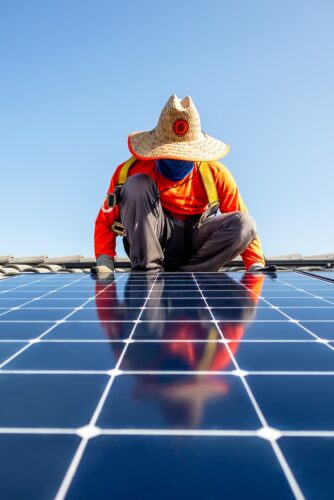
Renova has survived the rooftop solar changes in California by leaning into other service offerings and expanding regionally into Arizona.
After this story went to print, Renova announced it was temporarily halting operations in California and Arizona as a result of partial investor SunPower’s financial struggles.
Working as a residential solar installer in California has gone from a stable and reliable career path to one mired with uncertainty in the face of recent decisions by the state’s Public Utilities Commission. The new net-metering regime, NEM 3.0, drastically reduced the compensation for residents selling electricity back to the grid and has had a devastating ripple effect on solar companies in the state. The California Solar & Storage Association predicted California would lose 22% of its solar jobs by the end of 2023.
The companies persevering in this tough market foresaw these challenges and adjusted their businesses accordingly. After outlasting the global pandemic, Vincent Battaglia, CEO of Palm Desert-based Renova Energy (No. 133 on the 2024 Top Solar Contractors List) didn’t think anything tougher could possibly disrupt business until the California Public Utilities Commission (CPUC) began deliberating net-metering changes.
“I figured the worst thing that could come along is maybe aliens landing, but the CPUC one-upped the aliens, and we saw it coming,” he said.
Although installation efforts in California have been down, Renova has stayed afloat thanks to some of the company’s forward-looking initiatives.
Renova began a dedicated service department called RenovaPLUS in 2008, providing customers ongoing maintenance and panel cleaning as a way to win competitive deals, and then added in-house roofing services in 2020. The company also consolidated customer service for all branches into one department, so clients no longer have to hunt around for answers when they encounter an issue. This has improved the customer experience and Renova’s status in the solar community.
“We don’t do things that are not incidental to the business of building microgrids,” Battaglia said. “These are areas where you’re diversifying, but you’re not moving out of alignment with the ‘solar-plus’ industry.”
In addition to adding services, Renova opened a new office in Kingman, Arizona, in January 2023.
“[NEM 3.0] was such a disruption that having Arizona available to be able to move teams into there, or to be able to pull additional revenue, was awesome. That kept Renova moving,” Battaglia said.
The company’s service branch has flourished during the California residential solar downturn. What started as primarily a way to beat competitor deals has turned into a profit center of its own. Battaglia estimates that around 70% of Renova’s service business is now pure profit, helping customers of other solar companies maintain and clean their arrays.
A particularly flashy and unique piece of Renova’s service offerings is a new solar cleaning drone. Instead of two workers climbing a roof and hand-washing the panels, one worker on the ground can control the drone doing all the dirty work.
“We’re always trying to put us apart from anyone else, so I think the drone was a great opportunity for us to bring new technology into the industry, something that people haven’t seen, while also allowing us here to more efficiently do the job,” said Saman Kouretchian, marketing director at Renova.
 Renova currently has one Lucid Bots Sherpa drone that cost around $50,000. The drone not only attracts eyeballs in neighborhoods and online marketing, but it protects fragile tile roofs from breakage. Battaglia estimates tile replacements and associated labor cost the company around $150,000 last year. Renova charges a premium for drone cleanings vs. manual, so the company says the upfront drone cost was worth it. The company may even invest in a second drone after seeing high customer demand.
Renova currently has one Lucid Bots Sherpa drone that cost around $50,000. The drone not only attracts eyeballs in neighborhoods and online marketing, but it protects fragile tile roofs from breakage. Battaglia estimates tile replacements and associated labor cost the company around $150,000 last year. Renova charges a premium for drone cleanings vs. manual, so the company says the upfront drone cost was worth it. The company may even invest in a second drone after seeing high customer demand.
“We’re simply adapting technology into our evolving and our maturing solar-plus industry,” Battaglia said.
The California market is tough in the NEM 3.0 era, and it won’t be changing anytime soon. But Renova plans to keep pushing on, offering its suite of solar and roofing services and expanding further regionally. Battaglia is aiming to open a Phoenix office in 2025, then plans to move into Nevada. And Battaglia is anticipating that at least the next 10 Renova solar installations in each of those locations will all include batteries.
“I am excited, so excited, about a 10-in-10 installation in every one of those locations, and maturing RenovaPLUS service, so that we can service everyone’s system — the legacy as well as Renova systems,” Battaglia said.
This story was featured exclusively in our 2024 Top Solar Contractors issue. See the issue and full list of top U.S. solar installers here.


















